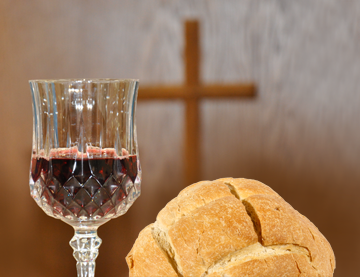A Supervised Lord’s Supper?


Historically, Reformed and Presbyterian churches have practiced elder supervision over admission to the Lord’s Supper. This historic practice has unfortunately been discarded in many churches. In other churches, even in the Canadian Reformed Churches, the practice is under pressure. When it seems like you’re the only ones doing this, it becomes difficult to maintain. After all, are we the only ones who see it rightly?
I’ve noted before how at least one historian attributed the loss of this practice in Presbyterianism to laxity in discipline. There may be other factors at work as well. Whatever the reasons may be for why an open table (with a verbal warning at best) is now the norm, those of us who still follow the historic practice need to review our reasons for doing so. If we’re going to maintain it, we ought to be confident that we’re doing this for sound biblical reasons and not simply out of tradition.
At the church I currently serve, we try to be sensitive to our guests. If we know someone will be attending on a Lord’s Supper Sunday, we try to speak with them ahead of time and tell them about our policy. On the liturgy sheet that Lord’s Day we also include our policy and an explanation of it. This policy is borrowed from the last church I served, which in turn, borrowed it from another Canadian Reformed Church. This is how it reads:
To Our Visitors and Guests: Our Supervised Lord’s Supper Celebration Policy
Welcome! We’re glad that you’re with us this Lord’s Day! You will notice that today we are celebrating the sacrament of the Lord’s Supper. We want to briefly explain to you our policy regarding who may partake of this sacrament at the Free Reformed Church of Launceston.
We believe that the Lord’s Supper is a celebration for and by the local congregation as body of our Lord Jesus Christ. Our official policy is that normally only those guests are admitted who are members of a Free Reformed church or a sister church and have made public profession of the Reformed faith and lead a godly life. As a rule, the status of these guests is articulated in an “attestation” [testimony] issued by the elders of the church in which this guest is a member. Such a written attestation assists the elders of the church in their supervision over the table of our Lord. It is the responsibility of the local elders to keep the celebration of the Lord’s Supper holy. They are called to be sure these guests are true believers who are faithful in their adherence to the Reformed faith and walking a godly life. The elders are the shepherds of God’s flock and they have a responsibility to protect the flock from the judgment that would fall on the whole congregation if the table would be profaned (see 1 Pet. 5:2 and 1 Cor. 11:27-32).
Please understand that with this policy, we make no judgment on your personal faith or relationship with Christ. We understand that it is somewhat unusual in the broader Christian context, yet we believe that it is biblical and what is biblical is best for our congregation. Moreover, we may be assured that by hearing the Word and watching the celebration of this sacrament, you will still be edified through the working of the Holy Spirit. Our Lord Jesus gave the sacraments as visible signs and seals for the strengthening of our faith as we focus our faith on the sacrifice of Christ on the cross as the only ground of our salvation. May its observance direct you to seek your life outside of yourself in Christ, for the forgiveness of your sins and everlasting life. May the Lord bless your attendance at our service!
If you have any questions about this policy, please speak to one of our elders or our pastor.
Most guests will read this policy, understand it, and respect our practice. I have only had one or two occasions where a visitor was offended or upset by our way of supervising the Lord’s Supper.
Let me also recommend an article by Rev. George van Popta on this topic. He explains the history and rationale more completely. He also goes into the way the Christian Reformed Church in North America changed course on this matter in 1975. You can find his helpful article here: Admission of Guests to the Lord’s Table.


